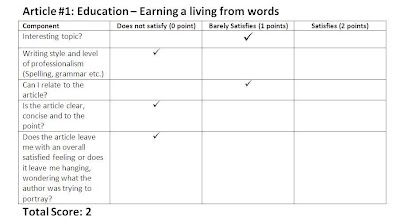

- The first factor, “Is the topic interesting?” If I don’t find the general topic of the article interesting, then I find myself asking why I am even bothering to read it.
- The second category is based on the writing style and professionalism of the author. This includes spelling mistakes, use of correct grammar, and the overall flow of the article. Failure to write at an acceptable level (neither too high nor too low), and the presence of spelling and grammatical errors greatly reduces the authors credibility and can greatly influence the readers opinion and understanding of the article.
- The third category deals with my ability to relate to the subject of the article. If the article has no meaning to me, then I am not likely to be interested. Being able to form a personal relation between the subject of the article and the reader can create a connection that causes the reader to become attached and want to continue reading.
- The fourth category deals with the conciseness of the article. Extra words and filler take away from the article and can turn an interesting article into a waste of words.
- The fifth and final category deals with the overall feeling I get after reading the article. If the article comes to a solid conclusion and answers the questions it originally raised, then it is a more effective means of communication and does not leave me looking to gain further information on the topic.
Article #1 was nowhere near perfect and was riddled with spelling, grammar, and formatting errors. The content of the article started off strong but quickly went downhill. The part about the death of the author’s father was unnecessary and did nothing to add to the point the author was trying to portray. This article raises a number of questions. First, how can someone who claims to “write for a living” produce something so full of errors? The author claims to have produced a variety of written documents including proposals, presentations, and sales letters. Even one small error in any of these types of documents instantly discredits the company they represent. I would be truly embarrassed to have an article like this published or even read by others.
Article #2 was not perfect either. After evaluating both articles with the scorecard I developed, I found “The value of an eduation* is in the process, not the paper” to be a better article. I must admit that I am hesitant to choose this article because it contains a MAJOR spelling mistake in the title. What makes this mistake even worse is that the word “education” is spelt wrong on an article that is written by an employee of the Okanagan College. While it may be a mistake on the part of the publisher and not the writer, it still makes the college look horrible. In fact, all I could think about the entire time I read the article was how bad of a mistake it was. Due to the fact that both articles have major flaws, I am hesitant to choose and support either one, however when evaluated with the scorecard approach, article #2 is clearly the better piece.